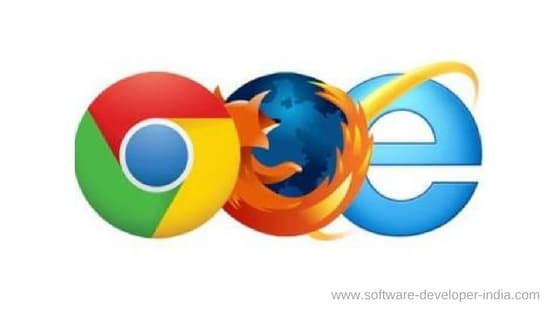Why Netscape Lost All Of Their Market Share To The Internet Explorer
When Netscape Navigator became king
Netscape Navigator, the web browser which ruled the world in the early 1990s succumbed to a sad end when Internet Explorer began to take the reins of the web browser world. Marc Andreessen, James H. Clark were the founders of Netscape Navigator in 1994 and its popularity grew far and wide. Netscape Navigator was launched at a time when the huge and costly super computers were replaced with more user-friendly and cost-efficient workstations. Netscape had to provide a range of complementary products when it was released because it needed the assistance of an operating system. So it depended on Mac, Linux or Unix. The development of Netscape was largely possible due to complementary plug-ins run from browser window. Eventually, the company began to realize that its success and profit lies with maturing applications market and Internet infrastructure.
When Microsoft came, Netscape had to bow out
Eventually, Microsoft’s Internet Explorer emerged as the most formidable opponent for Netscape Navigator. The fact that American Online supported Netscape did not help much. While IE was free, Netscape was not free completely and this brought a huge market share advantage to Microsoft. Actually, Netscape should have seen this was happening because Netscape knew in the beginning itself that Microsoft was interested in browsing technology and Netscape had rejected the offer about licensing their browsing technology with them in 1994. When Microsoft provided its own browser for free, Netscape also provided its own for free, but eventually lost out on its market share. Microsoft started with its own browser, but the initial endeavors were abysmal failures. The battle between Microsoft and Netscape started right about then and the email, conferencing and group discussion features that Netscape introduced were not very exciting when compared to IE. Netscape was pushed to a corner and it became just a stand-along browser.
Eventually, Microsoft’s IE came to be known as a stable browser and things started going downhill for Netscape. Their browser frequently experienced crashes, contained buggy codes, problems with browser resizing and most important of all, they couldn’t render HTML + JavaScript and CSS usage, which was getting quite intense and popular by then. All users of Netscape Navigator still have nostalgic feelings about this browser because that is how they started browsing the internet (the pioneer) and started knowing its immense possibilities.
Reasons for Netscape’s decline
Well, the obvious reason is Microsoft’s IE; it simply couldn’t stand up to competition. Other reasons could be
- Microsoft began commandeering a monopoly position through its office suite products space and DOS/Windows.
- Netscape lost its focus because instead of focusing on their browser and preventing it from bloating, they tried to become an complete bussiness communication tool
- They failed to understand the potential of the new marketplace that had opened up through Internet
- Netscape will not uninstall properly if users face problems with the browser; bad registry entry was causing conflicts with TCP/IP
- Netscape failed to integrate Microsoft’s OS products
- The decision made by Netscape to release their source code which eventually led to the forming of Mozilla Organization
- Failed to stand the test of time; AOL finally pulled the plug in 2008
How the Internet Explorer lost their market share to Google Chrome
While many people remember Netscape, Microsoft IE and Google Chrome, few hardly remember browsers like Spyglass, Web Explorer, UdiWWW and Opera. Of course, there were dozens of others too, but it was Google Chrome that replaced Microsoft IE eventually. By the time it was 2002, IE was reigning high with 96% of the market share and the rest of the people used the bloated version of Netscape, older version of Netscape and the other browsers. When Netscape could stand it no longer they gave their codebase to Mozilla and retired.
Internet Explorer, derived from Mosaic was released in 1995 and in the early days you had to pay for it. Yes- you really had to pay for your browser, though it may seem preposterous to you now. Then in 1996 when Internet Explorer 3.0 was released, it was free for all. With the success of IE came the biggest browser wars of all. Both Microsoft and Netscape Navigator fought for market and Netscape began to lose slowly until it eventually died out. IE reigned for a while till Chrome made its entry and took away all its glory. Until Chrome entered the scene and made a strong impact, Mozilla Firefox continued to hold the market share of the browsing world.
Why Google Chrome dethroned IE
After IE enjoyed its 15 minutes of fame, it had to give up the throne for Google Chrome. Initially, the market share was quite marginal with 32% of IE to 31% of Chrome. This could be because Google could not dethrone IE’s hold on desktop applications. Chrome was more intensive with its offerings to the mobile world. The grip that Microsoft had on desktop was significant while Google continued to offer consistence service through various mobile interfaces. In the meanwhile, Mozilla Firefox entered the scene and peeped in, but it couldn’t make an impact on mobile devices or with the desktop.
Reasons why Chrome came to be the most preferred one
- Google Chrome is integrated with a huge library of extensions, built-in applications and add-ons. This would help you enhance the functionality of your browser
- While the interface of IE was clunky, Chrome followed up with a clean and smooth interface
- You don’t have to wait for Google to load before typing something in the search-address bar. All the three steps are combined into one single-step that saves time.
- Do you want to get into Chrome’s task manager? Just press Shift and Esc buttons together
The Bottomline
Firefox and Internet Explorer are trying their best to match up to the skills of Google Chrome. Chrome is indeed superior and has a huge chunk of the market share already. There is no denying that.
Interesting links about the topic:
Why did Netscape lose to IE?
Netscape: The Web Browser That Came Back To Take Over Microsoft

The author: Reema Oamkumar is engaged as a thought leader at www.Software-Developer-India.com which is a part of the YUHIRO Group. YUHIRO is a German-Indian enterprise which provides programmers to IT companies, agencies and IT departments.


Leave a Reply